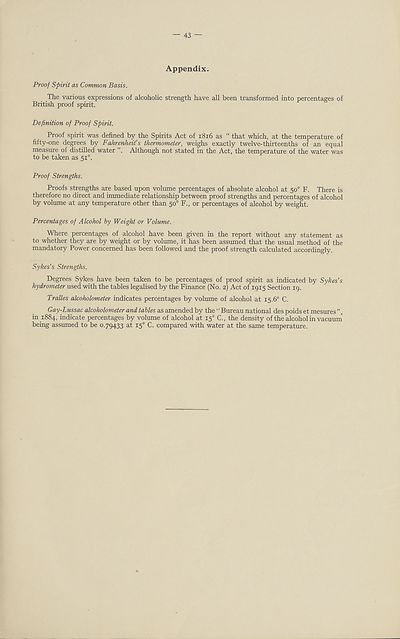Permanent Mandates Commission > Mandates : liquor traffic in territories under B and C mandates : statistics, summary of legislative measures and miscellaneous information
(43)
Download files
Complete book:
Individual page:
Thumbnail gallery: Grid view | List view

— 43 —
Appendix.
Proof Spirit as Common Basis.
The various expressions of alcoholic strength have all been transformed into percentages of
British proof spirit.
Definition of Proof Spirit.
Proof spirit was defined by the Spirits Act of 1816 as “ that which, at the temperature of
fifty-one degrees by Fahrenheit’s thermometer, weighs exactly twelve-thirteenths of an equal
measure of distilled water Although not stated in the Act, the temperature of the water was
to be taken as 510.
Proof Strengths.
Proofs strengths are based upon volume percentages of absolute alcohol at 50° F. There is
therefore no direct and immediate relationship between proof strengths and percentages of alcohol
by volume at any temperature other than 50° F., or percentages of alcohol by weight.
Percentages of Alcohol by Weight or Volume.
Where percentages of alcohol have been given in the report without any statement as
to whether they are by weight or by volume, it has been assumed that the usual method of the
mandatory Power concerned has been followed and the proof strength calculated accordingly.
Sykes’s Strengths.
Degrees Sykes have been taken to be percentages of proof spirit as indicated by Sykes’s
hydrometer used with the tables legalised by the Finance (No. 2) Act of 1915 Section 19.
Tralles alcoholometer indicates percentages by volume of alcohol at 15.6° C.
Gay-Lussac alcoholometer and tables as amended by the “ Bureau national des poids et mesures ”,
in 1884, indicate percentages by volume of alcohol at 150 C., the density of the alcohol in vacuum
being assumed to be 0.79433 at 150 C. compared with water at the same temperature.
Appendix.
Proof Spirit as Common Basis.
The various expressions of alcoholic strength have all been transformed into percentages of
British proof spirit.
Definition of Proof Spirit.
Proof spirit was defined by the Spirits Act of 1816 as “ that which, at the temperature of
fifty-one degrees by Fahrenheit’s thermometer, weighs exactly twelve-thirteenths of an equal
measure of distilled water Although not stated in the Act, the temperature of the water was
to be taken as 510.
Proof Strengths.
Proofs strengths are based upon volume percentages of absolute alcohol at 50° F. There is
therefore no direct and immediate relationship between proof strengths and percentages of alcohol
by volume at any temperature other than 50° F., or percentages of alcohol by weight.
Percentages of Alcohol by Weight or Volume.
Where percentages of alcohol have been given in the report without any statement as
to whether they are by weight or by volume, it has been assumed that the usual method of the
mandatory Power concerned has been followed and the proof strength calculated accordingly.
Sykes’s Strengths.
Degrees Sykes have been taken to be percentages of proof spirit as indicated by Sykes’s
hydrometer used with the tables legalised by the Finance (No. 2) Act of 1915 Section 19.
Tralles alcoholometer indicates percentages by volume of alcohol at 15.6° C.
Gay-Lussac alcoholometer and tables as amended by the “ Bureau national des poids et mesures ”,
in 1884, indicate percentages by volume of alcohol at 150 C., the density of the alcohol in vacuum
being assumed to be 0.79433 at 150 C. compared with water at the same temperature.
Set display mode to:
![]() Universal Viewer |
Universal Viewer | ![]() Mirador |
Large image | Transcription
Mirador |
Large image | Transcription
Images and transcriptions on this page, including medium image downloads, may be used under the Creative Commons Attribution 4.0 International Licence unless otherwise stated. ![]()
| Permanent URL | https://digital.nls.uk/193997912 |
|---|
| Shelfmark | LN.VI |
|---|
| Description | Over 1,200 documents from the non-political organs of the League of Nations that dealt with health, disarmament, economic and financial matters for the duration of the League (1919-1945). Also online are statistical bulletins, essential facts, and an overview of the League by the first Secretary General, Sir Eric Drummond. These items are part of the Official Publications collection at the National Library of Scotland. |
|---|---|
| Additional NLS resources: |
|

